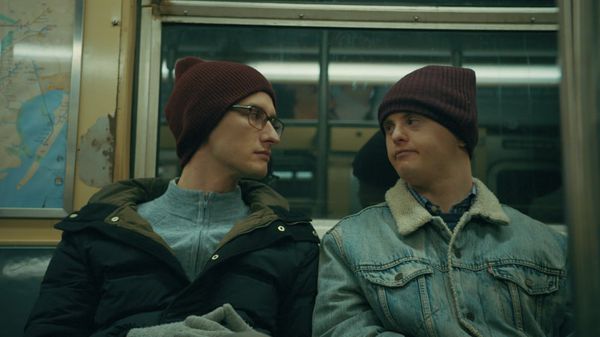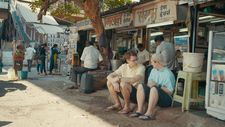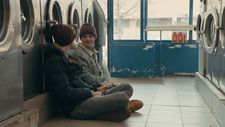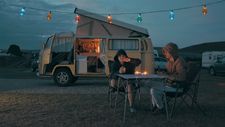 |
| Nick and Alex Bourne in Handsome Photo: courtesy of Glasgow Film Festival |
Growing up with a sibling who has Down syndrome is a complex experience. Nick has taken care of his brother Alex for many years, but they’re both adults now and he’s reached a point where he wants more out of life for himself. Uncertain how to navigate the situation, he and Alex decided to try and find other pairs of siblings in the same situation and ended up travelling around the world – to Cornwall, New York, India and Vietnam – to visit some of them, making a documentary, Handsome, in the process. They agreed to meet up online to talk about it as they prepared for it to screen at the Glasgow Film Festival.
It was only their second interview and Alex was a bit shy about it but was happy to let his bother do most of the talking. Nick began by explaining that it was their mother who originally suggested turning their quest into a film.
 |
| Watching the world go by Photo: courtesy of Glasgow Film Festival |
“There was nothing like it about siblings,” he says. “It was always about the parents, and there's nothing that I could relate to. So yeah, we kind of put the idea out, we made a little teaser trailer that the BBC picked up and put it on their homepage, and then this gave us a bit of kudos. And people found out about us and then wrote to us saying, ‘Oh, you know, my brother, or my sister, has Down’s.’ So it kind of all took off from there, really. We did lots of fundraising and we got good producers on board.”
How did they decide which stories to follow up and who to go and visit?
“That was the hardest thing, because there was so many things that we want to say that we couldn't, because of money and time. But we wanted to make it as diverse as possible. So we thought, okay, let's bring this closer to home. And then we thought, well, let's go to America. And then we wanted to go to Asia, to India, and Vietnam, and to really try and bring a bigger spectrum. But it was difficult because we wanted to see so many people, we just couldn't. I think it was important to limit ourselves to just four siblings, because I think we can be overwhelmed with the amount of stories in one documentary. And really bring out the best.”
I ask Alex how he felt about going to all these places. He smiles enthusiastically and nods when I ask if he liked it.
Was Nick concerned about the travel and taking his brother out of it his usual routine?
“Yeah,” says Nick. “Especially with Vietnam. Because obviously, there are moments that are not nice, you know, not easy for us to see. But I thought it was important from an audience perspective for us to go there. To kind of trust the process and trust that it will be okay. And actually, Alex was brilliant. You know, we went with two of my closest friends, who were filmmakers, and we had such a big bond that we trusted each other and thought, you know, we're going to do this together.”
What about the people who volunteered? How did you go about making sure that everyone who was participating understood what was happening as much as possible?
“When we met, we spent a lot of time off camera just talking about why we were there, just to make them feel comfortable, because ultimately, they're talking about their lives in front of camera,” he says. “That sometimes was not easy. So we wanted to say ‘Look, you know, don't say anything you’re not comfortable with.’ I think it's important to have that time to have trust in each other, because you're kind of opening your heart up to relative strangers. I was just saying this the other day, to a friend of mine, you know, when you are open yourself to someone, they're likely to be open to you.”
 |
| Dealing with the day to day Photo: courtesy of Glasgow Film Festival |
In that sprit, I note that this was a bit of a personal film for me because my first ever school friend as a child had Down syndrome and I remember the way she was bullied over it. Nick nods as if this is all too familiar. I add that I found it interesting to see that a lot of the people in the film seem to be quite successful and happy in their lives, to have escaped a lot of that or to have a really good support. Was that something that he and Alex found generally across the spectrum of people they spoke to?
“Yeah, yeah, we did,” he says. “They were quite fortunate in the fact that they did have a sibling. You know, many, many of us don't have a brother or sister. And I think that would be that would be even harder, you know, not to have another sibling. So yeah, it was really interesting.”
The most difficult situation really seems to be the first one, in Cornwall, where there's a lot of discomfort around how to handle talking about Down syndrome itself, and whether or not that should be discussed with people who are living with it.
“ It's kind of interesting from that perspective because I wasn't expecting it, I was expecting this full embrace of Down syndrome. And Molly wasn't like that at all,” Nick says. “She really sometimes didn't want to talk. And of course, we can't make a documentary without her and her thoughts and her opinions, so it was difficult. But, you know, I respect everyone's decision and everyone has their own opinion. It was just a bit of a shock. And I actually think it changed the trajectory of the film, because I was going into it thinking, you know, maybe we're going to be quite similar, but it didn't turn out that way.”
Alex perks up when I mention the very positive situation that they found in America, and it’s clear that he made a friend there. I venture that sometimes what gets missed from discussions around this is the friendship between siblings and what that means, aside from the care aspect of it. Was that something they were keen to bring out in the film ?
“Yeah, absolutely. Yeah. Because it's not just about the care stuff. Alex can be quite shy but at the same time, he's a chatterbox and he can be very different around different people. And you know, I think it was important to see that friendship in America.”
I ask Alex how he feels about the friendship he has with his brother and he beams as he looks at Nick, but he has something else he wants to talk about.
 |
| Chilling out together in the evening Photo: courtesy of Glasgow Film Festival |
“Krish What about Krish?”
Krish is someone they met in India. Nick asks Alex if he’s pleased to be friends with Krish, and Alex nods.
There are some other, more difficult situations that they encounter as well, particularly in the situation in Vietnam, with some of the ways that you they disabled people being treated, but there’s only so much space available to explore those issues in the film.
“Yeah,” says Nick, “and I never wanted to delve into that. I think we got to the last stages of India, and I realised, actually, there are some conditions that I didn't necessarily see firsthand. I thought I would be doing an injustice if we didn't try to at least explore that issue. And it's such a big issue that you're right. How do you fix it?“
We agree that there’s room there for another documentary. He’s been talking about wanting to do other things with his life. Is one of those things filmmaking?
“Yeah. One of my biggest inspirations is Louis Theroux and making documentaries that are thought provoking and just honest. And I think what makes me so proud is that we never had a plan in terms of how it would be filmed, and how it would go. With each location, we had an idea to see. But never once did we talk about what I would talk about, if that makes sense, and where the direction of the documentary would go. And I think that towards the end of the documentary, I kind of thought, you know, I need to pursue my dreams. And I got married this year, actually. So that was a big turning point for me and it was important to move on.”
I ask if Alex was involved at all in making the decisions about what would be in the film during the editing stages, and it turns out that he was and Nick wasn’t. Alex’s main concern was making sure that there was plenty of footage of Armond, the friend he made in New York.
“I wasn't allowed to see anything,” Nick says, explaining that his editor advised him that it’s sometimes better not to see oneself on camera. He was happy enough with this. “ I think it was important to kind of step back and trust that the boys would tell the story in an authentic way.“
How do the two of the feel about the finished result and how it's going down with audiences?
The glance at one another and nod on agreement. “Amazing,” says Nick. “We're so excited for people. I just can't wait for people to see it. It doesn't matter whether you have anyone in your life, I think you can take a lot from it. We’re siblings travelling the world, seeing different cultures. There's a lot of variety and yeah, we’re pretty proud of it. I think it's important when you do a project like this to just let go and people will have their opinions.”
I want to give the final word to Alex, since he’s been quiet for most of the interview, so I ask him whether he ever expected to be a film star.
“Yes,” he says decisively.





















